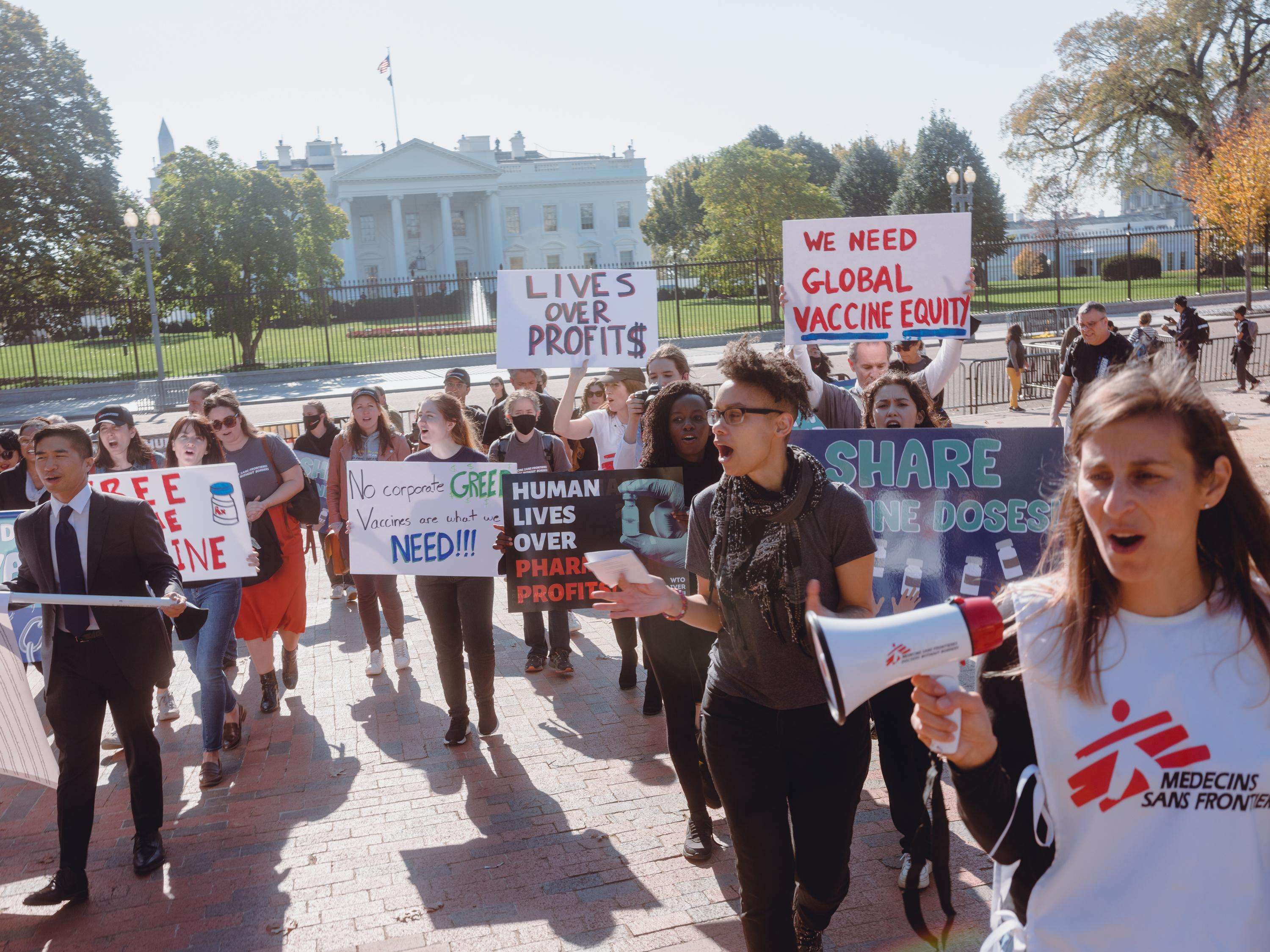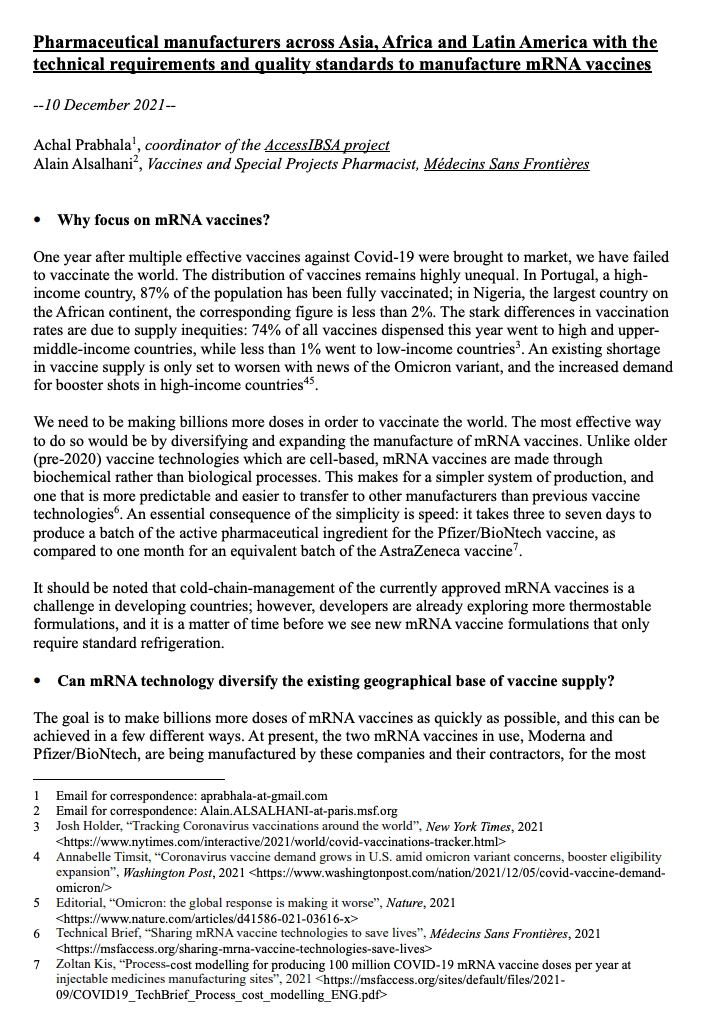Doctors Without Borders/Médecins Sans Frontières (MSF) and Human Rights Watch (HRW) sent the following letter this week to officials within the Biden administration urging them to demand Pfizer-BioNTech and Moderna share the COVID-19 mRNA vaccine technology and know-how that's needed to help rapidly expand the global vaccine supply. The pandemic won’t be over for anyone until it’s over for everyone.
Given the substantial US taxpayer funding provided to Pfizer-BioNTech and Moderna—for development and advanced vaccine dose purchases—the Biden administration must use legal leverage afforded by the Defense Production Act and other laws to direct these companies to share vaccine information with additional manufactures that can make these vaccines.
To protect their COVID-19 vaccine profits, pharmaceutical corporations claim that other global manufacturers won't be able to make mRNA vaccines even if they have the vaccine technology and know-how. However, a new report published in December 2021 by MSF and AccessIBSA project identifies more than 100 manufacturers across Asia, Africa, and Latin America with the technical requirements and quality standards to manufacture mRNA vaccines. Boosting the supply of mRNA vaccines, in particular, is critical as they can be quickly modified to respond to new variants, if needed, and have relatively short production times.
December 13, 2021
To: Mary Beth Goodman
Acting Coordinator for Global COVID Response and Health Security
US Department of State
2201 C St., NW
Washington, DC 20520
Cc: Jeff Zients, White House Coronavirus Response Coordinator and Counselor to the President; Ron Klain, White House Chief of Staff; Dr. David Kessler, Chief Science Officer for the COVID-19 Response
Re: Urgent Intervention to Ensure US Covid-19 Vaccine Developers Share Technology
Dear Coordinator Goodman:
We write on behalf of Human Rights Watch and Doctors Without Borders/Médecins Sans Frontières (MSF) USA to urge you to take all available measures to ensure US Covid-19 vaccine developers undertake technology transfers abroad and support the wider manufacture of Covid-19 vaccines to swiftly save lives and protect human rights around the world. The new Covid-19 virus Variant of Concern, Omicron, and emerging surges of the pandemic, make US government action more urgent.
While the US and other high-income governments are administering booster shots and third doses, many people at high-risk of severe illness and death in low- and middle-income countries are still waiting for their first dose. Severely unequal access to Covid-19 vaccines and global supply shortages continue to threaten health, lives, and livelihoods as new variants emerge. The US pharmaceutical and biotechnology companies Moderna, Pfizer, and Johnson & Johnson (J&J) developed or co-developed lifesaving vaccines, but they have not shared knowledge and technology widely with capable manufacturers in Africa, Asia, and Latin America, hindering the global Covid-19 health response and allowing the virus—including new variants—to spread.
The coordinator of the AccessIBSA Project and a vaccine expert from the Médecins Sans Frontières (MSF) Access Campaign have jointly identified over 100 manufacturers from Africa, Asia, and Latin America with the potential to produce mRNA vaccines. We have enclosed a copy of their report with this letter. In late October, the New York Times identified “10 strong candidates to produce mRNA vaccines in six countries on three continents.” In September 2021, Indian civil society organizations wrote to the US government, listing 34 potential manufacturers in 20 different countries who may be equipped to produce the J&J vaccine.
The US government should urgently identify capable manufacturers from these and other lists and ensure that they, along with relevant WHO technology transfer hubs, have timely access to intellectual property, vaccine technology, and materials needed to support manufacturing.
Transfer of the mRNA technology is of particular importance for global health now and for future pandemic preparedness. The WHO-listed Covid-19 mRNA vaccines showed great efficacy in clinical trials, and are understood to be among the easiest to modify to target new variants such as Omicron. As the MSF Access Campaign has explained, because the production of “mRNA vaccines is a relatively simple cell-free process more akin to biochemical synthesis than traditional cell-based production of vaccines,” it is “easier to standardise and therefore to transfer to more facilities in short timeframes.” In other words, many more manufacturers are capable of receiving mRNA technology transfer than technologies that rely on living cells, so mRNA technology holds out the promise of much more transformational impact on the geographical distribution of vaccine manufacturing. Finally, mRNA technology can be adapted rapidly to target other pathogens, meaning that building vaccine manufacturing capacity may offer significant long-term benefits for public health well beyond the Covid-19 pandemic.
The US government has substantially supported the three US vaccine makers. It provided significant funding for the underlying innovations that brought the Moderna, Pfizer-BioNTech, and J&J vaccines to the public so quickly and is uniquely positioned to ensure the benefits of publicly funded scientific research–especially in the cases of Moderna and J&J–are shared more widely. These companies have had ample opportunities to share technology and knowledge and enable the production of vaccines more widely but have failed to do so.
We urge you to take the following steps to scale up and diversify production and shipments of Covid-19 vaccines, especially prioritizing mRNA technology:
- Urgently take all available measures to ensure that US Covid-19 vaccine developers, particularly for mRNA vaccines, undertake more widespread technology transfers and oversee this process to ensure that as many capable manufacturers as possible from Africa, Asia, and Latin America receive timely access to intellectual property, vaccine technology, and materials needed to support manufacturing.
- Periodically and publicly report on the specific steps the US government has taken to expand technology transfers. This should include reporting on how global potential manufacturing capacity is being utilized and whether technology is being provided to relevant WHO technology sharing hubs.
- Support and work actively towards the adoption of a TRIPS waiver at the World Trade Organization for Covid-19 vaccines and other health products. This would help create a conducive environment for additional vaccine developers and manufacturers in low-and-middle-income countries in the long term.
These steps are in line with human rights obligations to engage in international cooperation to ensure the right to health and that all can benefit from advances in scientific research. Experts have mapped out the US government’s legal authority to act, including under the Defense Production Act. The US government has already used its leverage and executive powers to facilitate collaboration among companies to speed up vaccine manufacturing for domestic use. We strongly urge the US government to use all available regulatory and executive powers to expand technology transfers abroad. In the past, the US Biomedical Advanced Research and Development Authority supported other countries in developing vaccine manufacturing capacity to scale up influenza vaccine production starting in 2005.
The overwhelming majority of vaccine doses delivered by the US vaccine makers Moderna, Pfizer, and J&J have gone to high-income countries, according to data gathered by Airfinity and reported by the People’s Vaccine Alliance. The indefinite prolonging of the pandemic is linked to overreliance on vaccine supply from high-income countries, and while donations play an important role in the current context, an approach focused on charity rather than rights-based capacity building across the globe, is neither effective nor sustainable.
Pledges to redistribute vaccine doses purchased by the US, while welcome, are not enough. As of October 12, 2021, high-income governments had collectively pledged to donate 1.8 billion vaccine doses, but just 14 percent had been delivered, according to Airfinity data cited by the People’s Vaccine Alliance.
The US government’s failure to ensure more widespread technology transfers seriously undermines global efforts to meet human rights obligations regarding international cooperation, right to health and sharing the benefits of scientific research. Leaving pharmaceutical companies to decide where and how vaccines should be manufactured, to whom they should be made available, and at what price and other terms, is an abdication of the US government’s human rights and global health commitments and leadership.
We welcome the US government’s announcement on November 16, 2021 that it will invite US manufacturers to send expressions of interest to bolster vaccine manufacturing in the US starting in the second half of 2022, and donate more vaccine doses. The US government should attach conditions to any new investments to require the sharing of intellectual property and controls on pricing to maximize affordability, and ensure that there are no contractual restrictions placed on the US government’s ability to donate doses abroad, especially to low- and middle-income countries. But an approach that relies on dose donations is not sufficient, continues to significantly skew the supply chain, and leaves supplies unpredictable and precarious.
We also urge the US government to work with other governments for the swift adoption of a TRIPS waiver at the World Trade Organization covering vaccines and other health products. Human Rights Watch and MSF USA welcomed the US government’s announcement in May that it would support a waiver of certain intellectual property and trade rules needed for the Covid-19 health response. We are deeply concerned that a handful of high-income countries continue to block the TRIPS waiver, delaying access to lifesaving vaccines, treatments, and testing.
We have provided additional information in Annex I to demonstrate why long-overdue government intervention and oversight is immediately necessary. We stand ready to discuss this further with you and facilitate expert briefings with technical experts.
We hope the US government will also deliver on ensuring more widespread technology transfers as part of a rights-based approach to Covid-19 vaccine access.
Sincerely,
Akshaya Kumar
Crisis Advocacy Director
Human Rights Watch
Dr. Carrie Teicher
Director of Programs
Doctors Without Borders/Médecins Sans Frontières (MSF) USA
The full letter can be found online here.
How you can help
Not everyone can treat patients in the field. But everyone can do something.
Some humanitarian crises make the headlines—others don’t. Unrestricted support from our donors allows us to mobilize quickly and efficiently to provide lifesaving medical care to the people who need it most, whether those needs are in the spotlight or not. And your donation is 100 percent tax-deductible.





